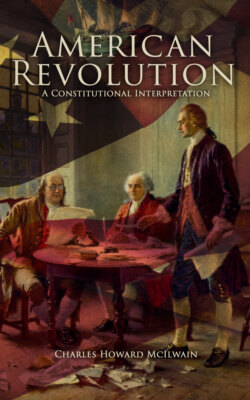American Revolution: A Constitutional Interpretation

Реклама. ООО «ЛитРес», ИНН: 7719571260.
Оглавление
Charles Howard McIlwain. American Revolution: A Constitutional Interpretation
American Revolution: A Constitutional Interpretation
Table of Contents
PREFACE
CHAPTER I. INTRODUCTORY—THE PROBLEM
CHAPTER II. THE PRECEDENTS—THE REAM AND THE DOMINIONS
NOTE TO CHAPTER II
CHAPTER III. THE PRECEDENTS—NATURAL AND FUNDAMENTAL LAW, TAXATION AND VIRTUAL REPRESENTATION, THE CHARTERS
CHAPTER IV. CONCLUSION
Отрывок из книги
Charles Howard McIlwain
e-artnow, 2021
.....
But what of the earlier phase, by far the larger phase, when American opposition is aimed solely at Parliament? Is that too revolutionary? Or is it merely constitutional? Did the American Revolution begin about 1761 or only with the attack on the Crown in 1776? This is a question harder to answer, and the answer must depend on matters purely constitutional, not political, as in the case of the defiance of the Crown after 1776.
For the period between 1761 and 1776 the non-revolutionary or revolutionary character of the resistance of the Americans must be judged upon the basis of the soundness or unsoundness of their constitutional claims. For those who believed that the parliamentary acts of which they complained were but parts of a settled plan to deprive them of legal rights by unconstitutional means, it might even seem a question whether the revolutionary acts were not up to 1776 all on the side of a Parliament that had assumed and exercised a power for which there was no warrant in English constitutional precedent. Long before that, they might plausibly have argued, the “unconstitutional” acts of the British Parliament itself had assumed a character nothing less than revolutionary, though it might be difficult to fix the exact point of time when they could first be said to be revolutionary as well as unconstitutional. On the latter supposition why might not the American Revolution properly enough be said to begin as early as May, 1649, with the Act that established the Commonwealth, with supreme authority in the Parliament of the English people over “the dominions thereunto belonging,” apparently the first formal assertion by a Parliament of its authority beyond the realm?
.....